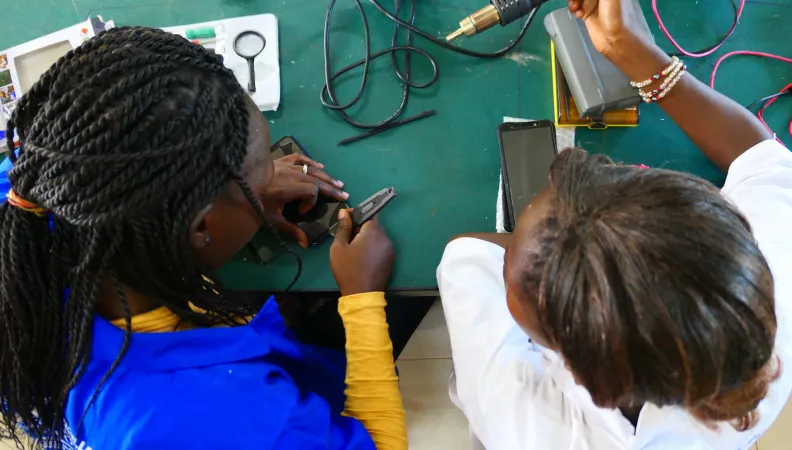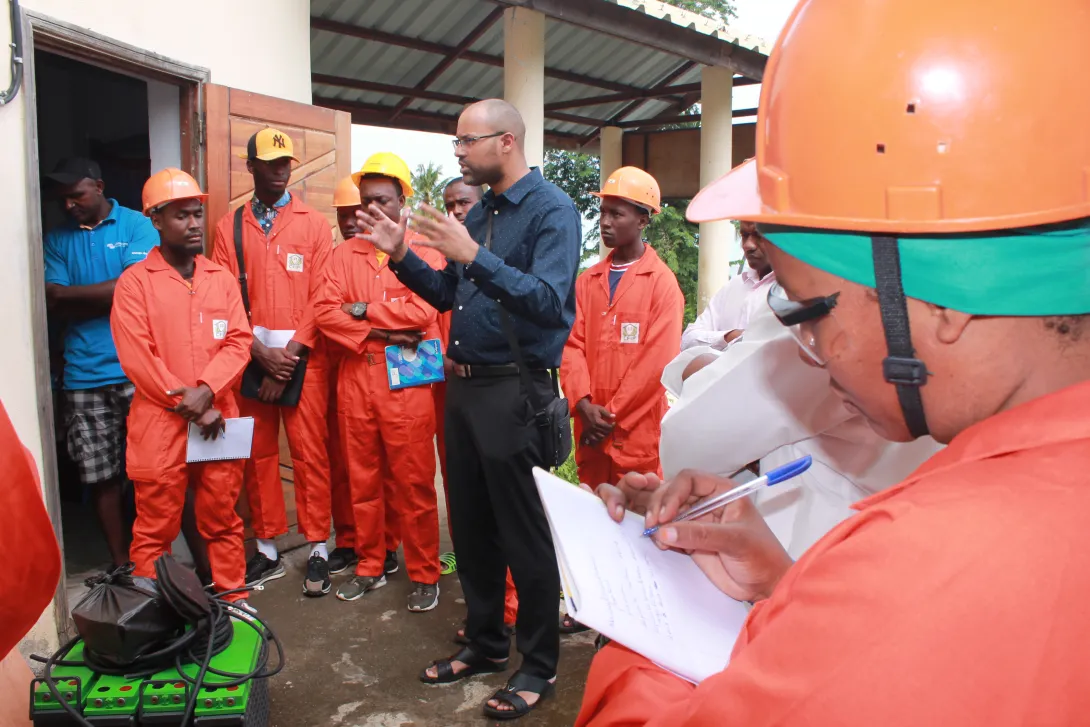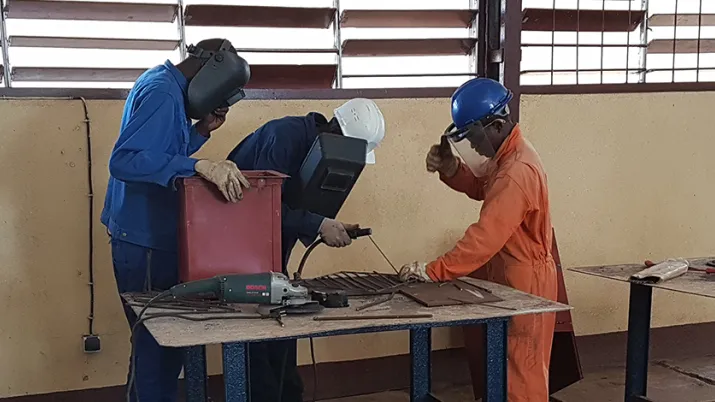Share the page
Our cooperation in training and employment - Our work and impact

Professional training and employment are essential to building fair societies in which each individual can contribute to sustainable socio-economic development, in line with their abilities and life goals. Both training and employment are key to social justice and sustainable development, and closely linked to the promotion of human rights.
32,267 people received vocational and technical training in 2024 thanks to Expertise France
They allow every person to create and seize opportunities, whether individual or collective, and to take part in building the future. International cooperation in training aims to strengthen technical and vocational training systems in order to increase employability, particularly among the most vulnerable groups or those who are cut off from the labour market (young people, women, disabled people, etc.). This enables such groups to find decent work and escape poverty.
However, our partner countries face numerous challenges related to training and access to employment:
- Demographic growth is fuelling a very rapid increase in the working-age population, while the economy’s capacity to generate formal employment remains limited, particularly in environments that are unfavourable to business.
- The employment problem leads to massive unemployment among young graduates living in urban centres and widespread underemployment among those living in rural areas.
- Many companies and organisations are struggling to find qualified candidates, which highlights the need to work towards a better match between the training offered and the skills required on the labour market.
As France’s international development cooperation agency, we implement projects aimed at identifying and developing solutions to meet these major challenges.
Our strategic priorities
As the primary source of income for individuals and families, a driver of economic empowerment and the first step towards social inclusion, employment is a right that must guarantee decent living conditions to all and be a source of individual fulfilment as well as social and civic inclusion. However, in many countries, economic growth does not automatically fuel an increase in the number and quality of jobs, and is not necessarily associated with a social safety net.
Therefore, our work in the field of training and employment focuses on improving policies and systems at national level and funding the professional training sector.
Other challenges relate more specifically to technical and vocational education and training (TVET) centres, which need to offer high-quality training courses that meet the needs of the labour market and to be sufficiently attractive to young people, particularly women, and to businesses. Closer links between training centres and small, medium-sized and large companies, as well as the development of work-based training through internships, sandwich courses and apprenticeships, are crucial to the changes needed to transform and improve the quality of training.

Our work covers six key areas, using complementary approaches:
- Support the development and management of public policies for training, employment and inclusion
- Foster stakeholder dialogue and coordination
- Support TVET centres to improve the quality of training offered and make it match the needs of the labour market
- Strengthen public services in employment, inclusion and youth programmes at central and local levels
- Support the implementation of professional training schemes tailored to the needs of economies and regions
- Support entrepreneurship
“Expertise France is tackling major issues in the fight against global inequality. To do so, we are harnessing the full strength of French expertise to improve professional training. Access to certified training programmes and better access to employment, particularly for young people, are central to the cooperation work we do with our partner countries.”
- CEO of Expertise France

Our framework for action
As a French and European public agency, we align our work in the training and employment sector with the strategic frameworks of our two main donors, the Agence Française de Développement (AFD) Group and the European Union (EU).
As technical and vocational training and employment occupy a prominent place in the 2030 Agenda for sustainable development, our work also contributes to the implementation of the Sustainable Development Goals (SDGs). This applies more specifically to SDG 4, which is to “ensure inclusive and equitable quality education and promote lifelong learning opportunities for all”, and to SDG 8, which aims to “promote sustained, inclusive and sustainable economic growth, full and productive employment and decent work for all”.
for further reading
Our services in this area
Our services in the field of professional training and employment include:
- Design and implement more effective public policies regarding professional training and employment, in consultation with businesses and social partners
- Improve the quality of and access to public TVET and employment services and align these with the needs of the labour market
- Develop skills and support users to access employment, self-employment and entrepreneurship
Ressources à télécharger
FAQs
For more about training and employment
International cooperation plays a key role in strengthening vocational and technical education and training (TVET) systems. It helps partner countries establish inclusive public policies, modernise training centres, adapt the courses offered and upskill trainers. In doing so, international cooperation helps to encourage youth employment, ensure vocational training matches labour market needs, and navigate the digital transformation and environmental transition.
As a public agency for French and European development cooperation, Expertise France supports vocational training through a broad portfolio of projects (covering 11 countries in 2024). Our aim is to make long-term improvements to TVET systems in our partner countries by targeting three priority areas:
- Design and implement public policies regarding vocational training
- Improve the quality of and access to public TVET and employment services
- Strengthen dialogue and coordination between stakeholders to foster the development of skills that are in demand on the labour market
International cooperation helps to foster more employment-friendly environments for youth, women, and vulnerable and migrant groups by supporting the development of public employment services, promoting self-employment and entrepreneurship, and building bridges between training and employment.
Working alongside our public sector partners, Expertise France implements projects that:
- Strengthen public services for employment, inclusion and young people at central and local levels
- Offer schemes that combine career guidance, training and employment to help users access employment and self-employment
- Strengthen career guidance services to help learners enter the labour market through internships, jobs and business creation
- Support productive employment and decent work for all
- Support employment schemes that align with local needs
For example, our LAMARR project in El Salvador promotes social inclusion and employment through digital technology in vulnerable neighbourhoods, while the RETFOP project in Angola promotes apprenticeships and public-private partnerships.
our projects
Project Africa-Europe Youth Academy (AEYA) - Develop youth leadership in Sub-Saharan Africa
Ongoing
2025 - 2029
Funders : European Union
Key figures in 2024
- 13 ongoing projects in 11 countries and 2 regional projects in Africa
- 514 universities and training centres received support in terms of training and/or access to the labour market
- 2,435 staff strengthened their skills/knowledge of training and/or access to the labour market
- 32K people received professional and technical training thanks to support from Expertise France



